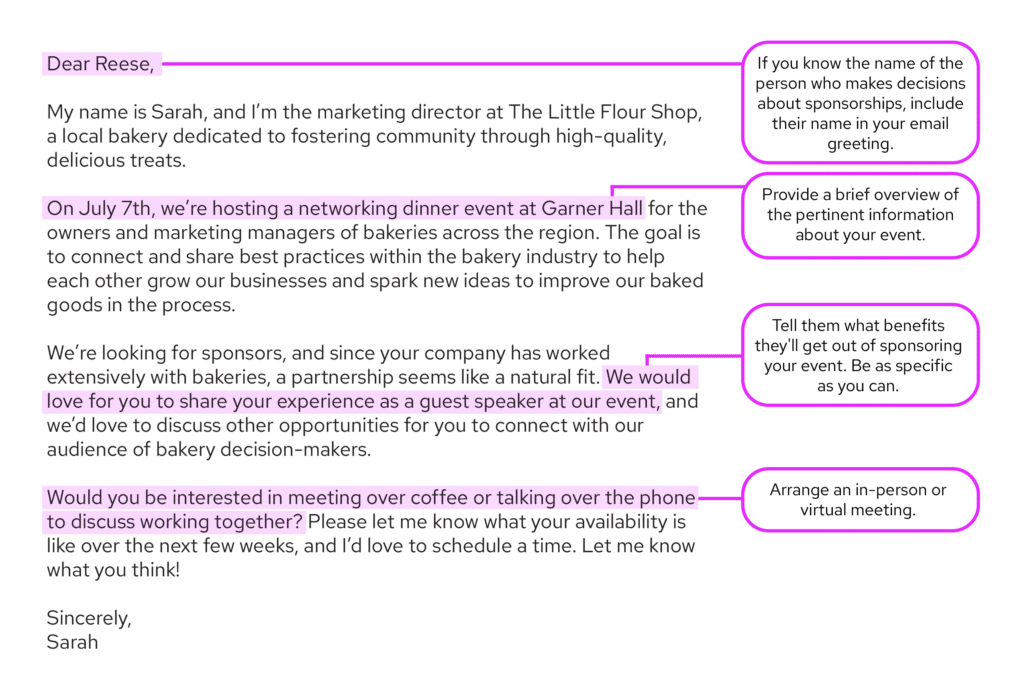Event Marketing
How to Find the Best Sponsors for Your Event
Looking for tips on effective ways to increase your event budget? Getting sponsors for your event is a simple way to boost your bottom line and make your event stand out! By offering unique sponsorship opportunities to local organisations that fit perfectly with your brand, you'll not only help fund your events but also grow your sponsors' businesses and build stronger relationships with them. Eager to learn how? Check out our detailed guide on how to get sponsors for an event to help make yours even better!
How event sponsorships can help you
Hosting a successful event is a team effort, and sponsors are a part of that team. Simply put, a sponsorship is a partnership between you (the event organiser) and a company or individual who provides funding and/or resources, usually in exchange for visibility and other promotional opportunities at your event.
For one, sponsorship deals will give you a nice influx of cash to increase your budget and supplement your other revenue streams (like ticket sales and merchandise). Sponsors can also help you reach a wider audience by promoting your event on their social media or doing a ticket giveaway with their customers. Think about creative ways to incorporate them into your different marketing strategies so you'll get more people to come to your event!

How to find sponsors for an event
Finding candidates is the essential first step to successfully getting sponsors for your event. Here are some tried and true steps to help you in your research:
1. Determine your event's target audience
Your sponsors will want to ensure their target audience aligns with yours. In this initial stage, collecting key data points on your current audience will help you figure out the ideal size and types of the businesses to partner with for your events. To determine this, use answers from your registration questions at checkout to learn more about your ticket buyers. This could include a breakdown of your target audience's age, gender, location, and general interests. The more data you have, the better!
Additionally, by connecting your event website to a data collecting software like Google Analytics, you can gain a lot of insights on who your site visitors are and how they engage with your content. You should also use analytics from your social media platforms to track the demographic trends of your followers. These tools combined will give you a clearer picture of your target audience, which you can share with a potential event sponsor!
2. Compile the stats for your event sponsorship proposals
Put together a sponsorship deck or document to highlight your attendee demographics as well as your various offerings (we'll get to this in a moment). Be sure to include your event's expected attendance and your average traffic to your social media, website, and newsletters. Remember, event data is everything! At least 50% of your event sponsorship package should be centered around key data points about your audience and event. Companies want to see a return on their investment, so showcasing these numbers is essential.
To make your pitch even more compelling, share examples of other companies you've worked with as past sponsors. This builds credibility and demonstrates the value you’ve delivered to others. Thanks to these hard numbers and success stories, you'll create a more compelling pitch that highlights the exposure your sponsors will receive and the potential new leads they could gain by partnering with you.
3. Put together your list of potential sponsors
Think about what kinds of companies would want to connect with your audience. If you have a niche audience, look for companies that match those interests (like an indie artist partnering with a local radio station for their concert). If you have a larger audience with a wide range of interests, focus on major corporations that are looking for brand awareness and want to promote heavily. Local businesses like restaurants and utility companies can be a great fit here. As a rule of thumb, smaller events are the perfect outlet for small business partnerships, while larger events may be better suited for corporate sponsors.
a. Use your network
Increase your odds of getting sponsorships by starting with the people on your list who you already know. An established relationship can go a long way towards getting a yes. If you get a no, that's alright! Use it as an opportunity to get feedback on how you can be more appealing to sponsors, increasing your success with future pitches.
b. Pinpoint your community's heavy hitters
Research organisations that are popular locally and actively promoting themselves. You could also investigate what companies sponsor events in your local community the most, or even visit their vendor booths yourself at other local events like festivals, fairs, or conventions. That way, you can network with potential sponsors in person, so when you reach out to them later, they'll remember your conversation!
c. Find sponsors online
Don't underestimate the power of a simple Google search! By doing so, you can easily target organisations that align with your mission. You can see what events they might already be sponsoring and who to contact about sponsoring yours. Additionally, AI tools like ChatGPT can be incredibly helpful in this brainstorming stage, offering ideas for types of organisations to research based on your event type and target audience. With a little extra digging online, you may come across partnership suggestions that you might not have come up with yourself!
What types of event sponsorship you should offer
Want to know how to get sponsors for an event? It's no secret – offer irresistible sponsorship packages! For example, if you're hosting a beverage festival, giving a local brewery the chance to show off their latest brew is a match made in heaven. By showing prospects that you've done your homework and already have effective sponsorship ideas lined up, you'll gain their confidence and make it easier to land some awesome deals!
Specific sponsorship placements
Think about what makes your event unique and how you can incorporate potential sponsors into them in an organic way. Consider giving them a booth onsite to interact with attendees, collect their contact info, and turn them into future customers. Use their company's name and logo across your event's signage and promotional materials to increase brand visibility. You could also use the sponsor's logo on merchandise, drinking cups, or handheld fans. You could even have a branded photo booth or backdrop with the sponsor's name incorporated on it (perfect for social media posts!).
Experiential sponsorships
Creating memorable experiences for attendees is a surefire way to leave a lasting positive impression of your sponsor's brand. Experiential sponsorships go beyond just logos and banners — they actively engage attendees in ways that truly interest them, providing value to their overall experience. This could include branded art installations, sponsored cooling stations on a hot summer day, or a delicious meal provided by your sponsor. Remember, the more creative and interactive the event sponsorship activations are, the more likely attendees are to remember their brand!
As for some other ideas, sponsors could host a VIP lounge where select attendees can relax, enjoy complimentary refreshments, and enjoy exclusive entertainment. To encourage engagement with your sponsor, you could implement a QR code scavenger hunt with clues that lead attendees to the sponsor's booth or activation area, plus offer branded prizes for completing the activity.
Tiered sponsorships
With tiered sponsorships, your sponsor can determine what price suits them and, in exchange, how much their brand is used throughout the event. A lower tier might offer brand placements in your newsletters and promotional materials or a shoutout on their social media posts. With higher tiers comes greater visibility, like sponsoring a happy hour or your performance lineup, and potentially even a title sponsorship, if they want to go all out for your event!
In-kind sponsorships
While sponsorships typically involve money, they might offer other resources or perks instead in exchange for exposure at your event. For certain companies, it’s easier to donate inventory or time rather than money, making in-kind sponsorships a practical and mutually beneficial solution. If you're in need of a caterer, consider finding local restaurants to feed your attendees in exchange for free event promotion. Work with a local radio station to help spread the word about your event in exchange for a booth at your venue.
The strategic thing about in-kind sponsorships is that you can count these contributions towards the “dollar value” you’re raising for your event, which can help strengthen your case when pitching future sponsorships. Want to know the recipe for a perfect sponsorship? Find ways to team up that highlight each other’s strengths and meet both parties’ needs!
Media sponsors
Media sponsors are a fantastic way to amplify your event’s reach! By partnering with outlets like local newspapers, radio stations, or online publications, your event gains valuable exposure through advertisements, articles, interviews, podcasts, or live media coverage. This visibility can generate additional buzz to draw in a larger crowd. Plus, you can aid their initiatives by giving them a compelling story to tell and connecting them with your attendees. Better yet, collaborate in creative ways that align with their brand values, such as supporting a shared community cause. By working together, a media sponsor can spread word about your event while you help them meet their goals.
Custom sponsorship proposals
Want to increase your chances of winning over a potential sponsor? Flexibility is key! There’s no “one-size-fits-all” pitch, because every company has unique goals and priorities. The best way to build mutually beneficial partnerships is to first have an open, honest conversation with potential sponsors. Ask about their needs and what they hope to achieve through sponsorship. Then, design a proposal that highlights how your event directly supports their objectives. By customising the sponsorship package to align with their brand and goals, you create a win-win scenario that not only benefits your event but also makes your proposal much more compelling!

How to approach event sponsors
Now that you know how to find sponsors for an event as amazing as yours, how do you convince them to partner with you? One of the trickiest parts of landing sponsorships is figuring out the best way to approach potential partners.
The importance of building your case before reaching out
When it comes to securing event sponsorships, your work starts long before you send that first email or make that first call. Sponsors want to see that your event vision already has some traction, so building momentum is key. When it comes to major companies or financial sponsors especially, they’re approached constantly with sponsorship pitches, so you need to show them why your event stands out — and why saying “yes” is the right choice.
To draw attention to your event, this could include engagement on social media, coverage in local media outlets, or even in-kind sponsorships from other partners. These indicators demonstrate that your event has a growing buzz and an established base of support, making potential sponsors feel like they’re missing out if they don’t jump on board!
Tips for contacting companies for a sponsorship pitch
So, you've got your list of potential partners and your upcoming event is generating some buzz. Now, it's time to approach them! An email is a great way to start the conversation, but you'll need to go the extra mile to make sure yours is at the top of their inbox (especially because business owners and other decision makers often get tons of requests and pitches).
If you've been referred to this company by someone you know, be sure to mention them as well and see if they can put in a good word for you at the time you reach out. Plus, if you network with a potential sponsor in person (e.g., at a community event or by visiting their business), you'll be a step ahead since this email will be more of a follow-up, rather than an initial outreach email.
Here are some questions to consider so you can cut through the noise and get the response you're looking for:
- Who? – At large companies, it's often the marketing team (like a content marketing manager or sponsorship coordinator) who makes the decisions about sponsorships, so contact them directly. In the case of smaller businesses, you'll want to reach out to the owner or general manager.
- What? – Give a brief description of your event (including the planned date and location) and its goals. Rather than send these businesses an extensive sponsorship proposal upfront and expect them to read through it, simply ask to schedule a discovery meeting to learn more about how the company might sponsor events. Then, you can follow up with a package that's tailored based on your discussion.
- Why? – This is the most important part of your email. Tell them why they should sponsor your event. This initial email is not the place to focus on yourself or a specific dollar amount, but rather what your prospective sponsor will be getting out of the partnership. Be as specific as possible about what you can deliver.
- How? – Show the organisation that you've chosen them for a reason and that you have a solid understanding of what they do. Give them a taste of the ideas you have in mind for this partnership and they'll see that you've put some thought into your decision to reach out to them.

Keep your letter short and sweet, including only the most important details. That way, you'll have more luck in getting sponsors for your event to read your entire email. Also, consider your audience when determining the tone of your email. You want to be polite and friendly, but there's no need to be overly formal — especially if you're reaching out to someone you already know.
Building a connection with your event sponsor
You emailed everyone on your list and all that hard work paid off — you got a response! Now it's time to grow that relationship. If possible, try to meet with them face-to-face, ideally in person or through a video call. To help ensure this meeting is a success, prepare the pitch for your sponsorship proposal as well as your answers to anticipated questions about it. This might include things such as pricing options, event logistics about where their logo and name will be seen, or how the sponsor will benefit from working with your event. Having an event day checklist can make this discussion easier as well. To help, here are the top questions your sponsors will want answered:
What is the cost per reach? (And what does that mean?)
The total cost of sponsoring your event is important, but sponsors are more interested in how much they are paying per attendee. The more aligned your attendees are with their target demographic, the more potential sponsors will be willing to spend.
What are the additional costs in sponsoring your event?
To make the most out of this partnership, sponsors need to spend more than just the check they write to your event. When sponsors spend money on independently promoting and marketing sponsorships, that's called sponsorship activation. This includes finding PR opportunities before the event, giving out swag, displaying banners at the event, and building a booth. Showing that you're aware of these activation costs is reassuring to sponsors.
Does your event match their company's core values?
One of a business owner's priorities is to uphold their company's values and ensure their partners do the same. This sponsorship proposal is your chance to demonstrate how your organisation's unique story shares those values and how your audience matches their target market.
Are there any indirect benefits?
If a company sponsors your event, consider offering some added bonuses in return for helping you. For example, you could give away free tickets or backstage passes to meet your performers or celebrity guests. They could pass these perks onto their VIP clients too, extending the effectiveness of their sponsorship.
Making those relationships last
Securing sponsorships is a big achievement — congrats! But sponsorship success doesn’t end when your event does. In fact, the days and weeks that follow are just as crucial as the event itself. This is your opportunity to showcase the value you provided, nurture your sponsor relationships, and set yourself up for future partnerships down the line. Sponsors will be evaluating whether their investment was worthwhile and deciding if they’d like to partner with you again. Let's dive into how you can ensure they’re eager to say "yes" next time!

The critical two-week window
The first two weeks after your event are extremely vital. This is the ideal time to follow up, reinforce the impact of their sponsorship, and establish trust. Here are the key points to address in this time:
1. Provide a fulfillment report
Your sponsors want proof that their investment paid off, and a fulfillment report is the perfect way to showcase their return on investment (ROI). This report should include:
- Key data points, such as attendee demographics, engagement metrics, and impressions from the event.
- Specific deliverables outlined in your sponsorship agreement, showing how you met or exceeded expectations.
- Photos, videos, or testimonials that highlight their brand’s presence and impact at your event.
A well-prepared fulfillment report reassures sponsors that their partnership with you was valuable and demonstrates that you take their investment seriously.
2. Ask for feedback
Your sponsors’ feedback is invaluable for improving future events and maintaining strong relationships. Schedule a quick call or send a survey asking them:
- What did they like about your event?
- What areas of your event could be improved?
- How can you better showcase their brand in the future?
This shows your commitment to your sponsors, which can set you apart as a reliable partner.
3. Ask the big question
Don’t be afraid to ask directly: “How can I ensure you’ll be back next year?” This simple question opens the door for honest feedback while reaffirming your commitment to making the partnership even better next time. Sponsors will appreciate you for being transparent and intentional!
Tips for building long-term sponsor relationships
A solid post-event strategy includes ongoing communication to keep sponsors engaged and eager to work with you again. Nail this phase, and you’ll not only secure repeat sponsorships but also create additional advocates who may recommend your event to others.
Show your appreciation
Want to go the extra mile? When your event is over, send a personalised thank-you email or even a handwritten note to show how much you value the partnership. This small gesture can leave a lasting impression and make sponsors feel appreciated for their investment in your event.
Stay in touch year-round
Keep your sponsors in the loop, even during your event’s off-season. Occasional check-ins — like a holiday greeting or an update on your organisation — keep you top of mind. Share any relevant news about your event that reinforces its value, such as attendee growth, new partnerships, or exciting changes for the next year. Plus, this will make it easier to reach out to them in the future about additional partnership opportunities.
Mastering the art of event sponsorships
As the event organiser, it's your responsibility to ensure your sponsors will be taken care of well after your big day is over. Follow our tips, and you'll be on your way to becoming a pro at gaining event sponsors. With these established connections, you'll know exactly how to find sponsors for an event in the future!

Event Registration Made Easy
Stay Ahead With Our Latest Event Articles Delivered Straight to Your Inbox
Subscribe today to elevate your event planning game!
Receive exclusive insider tips on how to:
-
- Plan a successful event
-
- Maximise your ticket sales
-
- Optimise your marketing campaigns
-
- Ensure your event day runs smoothly





